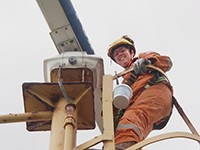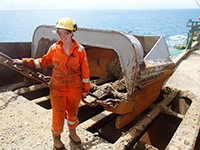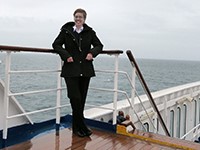Conversation with Sonia Mitchell – Second Officer on dredgers
Sonia as deck officer works on dredgers operating mainly in the North Sea and along the south coast with a compact crew usually of eleven. She started studying for her cadetship in her early thirties which was an advantage as she had much wider life skills than her younger colleagues many of whom were fresh out of school. Sonia had been doing a summer job working with Isle of Wight ferries when she happened to sea a poster advertising careers in the Merchant Navy which put her in touch with SSTG.
“I was impressed straight away as at college I got to work with retired seafarers, so people who have been doing the job that you are training for and who provide a lot of practical advice before you even get to sea. And SSTG were very supportive throughout. You have your training coordinator throughout your time at college and whilst training at sea who is a point of contact for you if you have a problem. And they arranged very regular meetings with you whilst you were in college.”
“Everyone gets to know each other and they did really look out for me.”
“Once you’ve done the theory at college you get on board ship and they want you now to do all of the practical stuff. It takes a while before you are allowed on the bridge to start doing navigation. You really get thrown to the deck team to learn practicalities but it was a good experience. And I was lucky in that the crew I was working with was quite small – so everyone gets to know each other and they did really look out for me.”
“You start shadowing the crew whose jobs you are going to be doing and you get to learn why the tasks are important, and if something has gone wrong you quickly learn how to fix it and make it right again.”
“On the dredging side it’s in effect a two-man operation. The captain will control the dredge pump and the pipe itself, raising it and lowering it as required, and will set our location on our track. And as second officer on the bridge your job is to firstly maintain your normal lookout as the captain is having to look towards the stern during dredging operations. You are also controlling the track of the ship as we don’t have dynamic positioning and do ours by hand. You are travelling about half a knot to one knot hand steering up and down lanes so it is very precise.”
“The other side of my responsibilities is cargo discharge. Our cargo goes into an open hold in the middle of the ship and once we are alongside we operate buckets to discharge the cargo on to conveyor belts. This is usually about a five or six hour operation to discharge all of the cargo and your task is to also monitor for cargo spillage and maintaining the right rate of discharge. Ballasting is a one-person operation so the captain is not needed for that, just you as the officer of the watch.”
“Not many people think about dredging as a career but once you get into it people tend to stay.”
“Dredging does require that we work very hard but the advantage is that you are always busy and the trips go very quickly. Our trips are for usually two or three weeks at a time, and then you get the same amount of leave, so for your work-life balance it is well worth considering. Not many people think about dredging as a career but once you get into it people tend to stay!”
There are many demanding skills required in dredging efficiently and safely, with the need to travel at exceptionally slow speeds a key element of operations at sea.
“You quickly have to learn good practice in ship handling especially when doing very slow speed manoeuvres.”
“Whilst we are dredging we are going into shallow waters, so for example if we are dredging at the side of sandbanks you have to constantly monitor positioning to ensure you are not going to ground the ship. And predicting what the tide is going to be doing is key as it will try and sweep you off course whilst operating at slow speeds. You quickly have to learn good practice in ship handling especially when doing very slow speed manoeuvres, which on other types of vessels at this level as an officer you wouldn’t normally be responsible for.
“Also on dredgers maintaining the cargo gear requires a very specific set of skills, and as you are in and out of port very frequently you quickly get a lot more navigation experience too. Many ships will sit at anchor but we are in and out of the Thames several times a week, and we are crossing The Channel a lot across some of the busiest shipping lanes in the world where you gain responsibility much quicker than you would on bigger ships.
“The great thing about working on dredgers is that you can fit your career around having a life at home as well.”
“The great thing about working on dredgers is that you can fit your career around having a life at home as well as it doesn’t require being at sea for months. And it’s not just for people who are at the start of their careers and don’t have families yet. The Merchant Navy is for a wider range of people than that. People spend their whole careers on dredgers – and I certainly intend to be here for many years!”
Start Your Career
Our experienced team of recruitment and training officers can provide you with help and guidance on roles and vacancies – and support in applying for sponsorship.
The Precinct Office
The Precinct
Rochester
Kent
ME1 1SR
We’d love to
hear from you!
Tel: +44 (0) 1634 820 820
E-mail: recruitment@sstg.org
The legal stuff
Privacy Policy
Terms & Conditions
© 2013 – 2022 Ship Safe Training Group Ltd (SSTG) All Rights Reserved except where otherwise stated.


